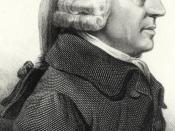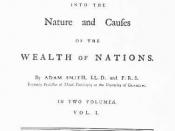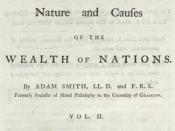After two centuries, Adam Smith remains a genus in the history of economic thought. Smith is known primarily for a single work, The Wealth of Nations, the first proposed system of a political economy. Smith is properly regarded as a social philosopher. His life and The Wealth of Nations is not just a part of economics but a facilitator of historical evolution. Unfortunately, much more is known about Smith's ideas than his life. Though the exact date of his birth is unknown, he was baptized on June 5, 1723, in Kikcaldy, a small town. Smith's childhood is rather unknown besides the fact that he received his elementary schooling in Kirkcaldy. By the age of four years he was said to have been carried off by gypsies. Adam was eventually abandoned by his captors. At the age of fourteen, in 1737, Smith entered the University of Glasgow, at the time of the Scottish Enlightenment.
Graduating in 1740, Smith won a scholarship (the Snell Exhibition) and traveled on horseback to Oxford, where he stayed at Balliol College. Compared to the stimulating atmosphere of Glasgow, Oxford was less moving. His years there were spent largely in self-education, from which Smith obtained a firm grasp of both classical and contemporary philosophy. Returning to his home after six years, Smith looked for employment. He gave public lectures in Edinburgh. The lectures, which ranged over a wide variety of subjects from rhetoric history and economics, made an impression on some of Smith's notable historical figures. They also had a marked influence on Smith's own career, in 1751, at the age of 27; he was appointed professor of logic at Glasgow. Then he changed to the more lucrative professorship of moral philosophy, a subject that embraced the related fields of natural theology, ethics, and political economy.


